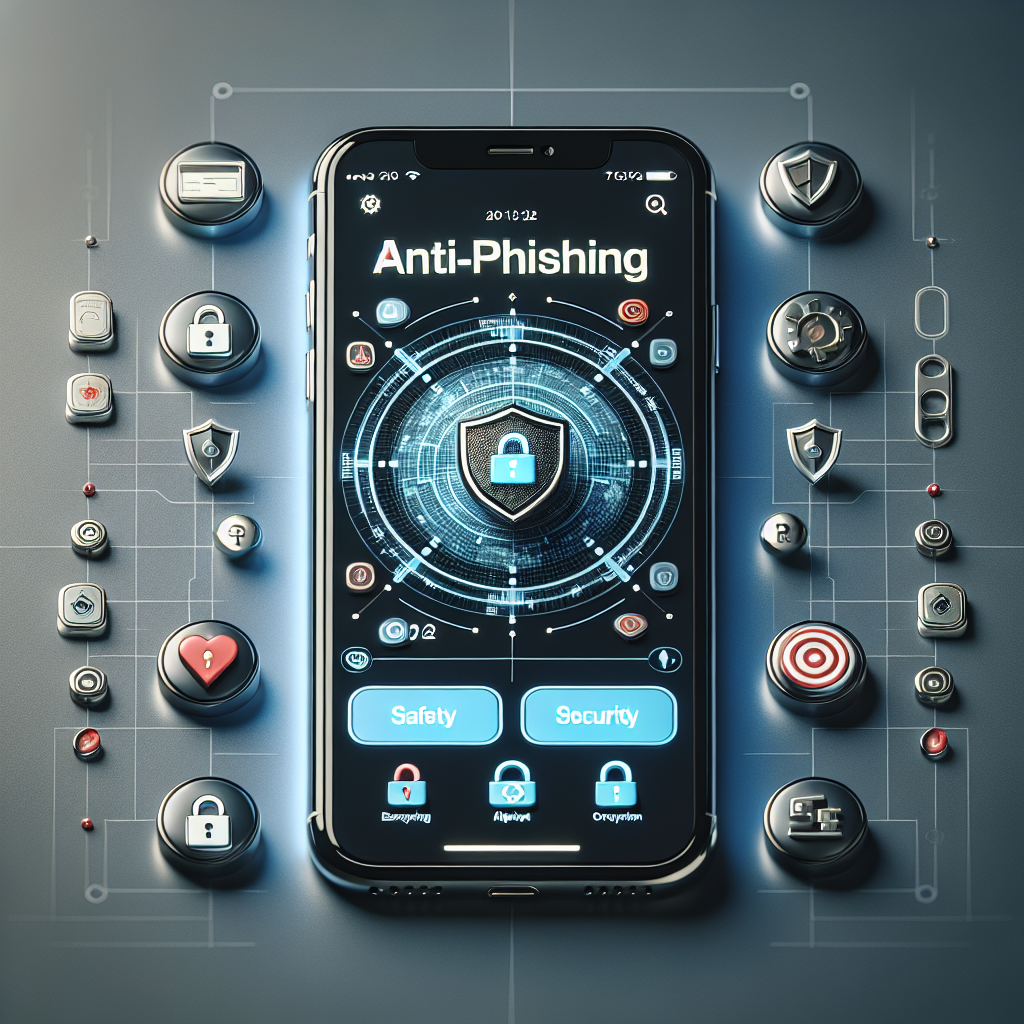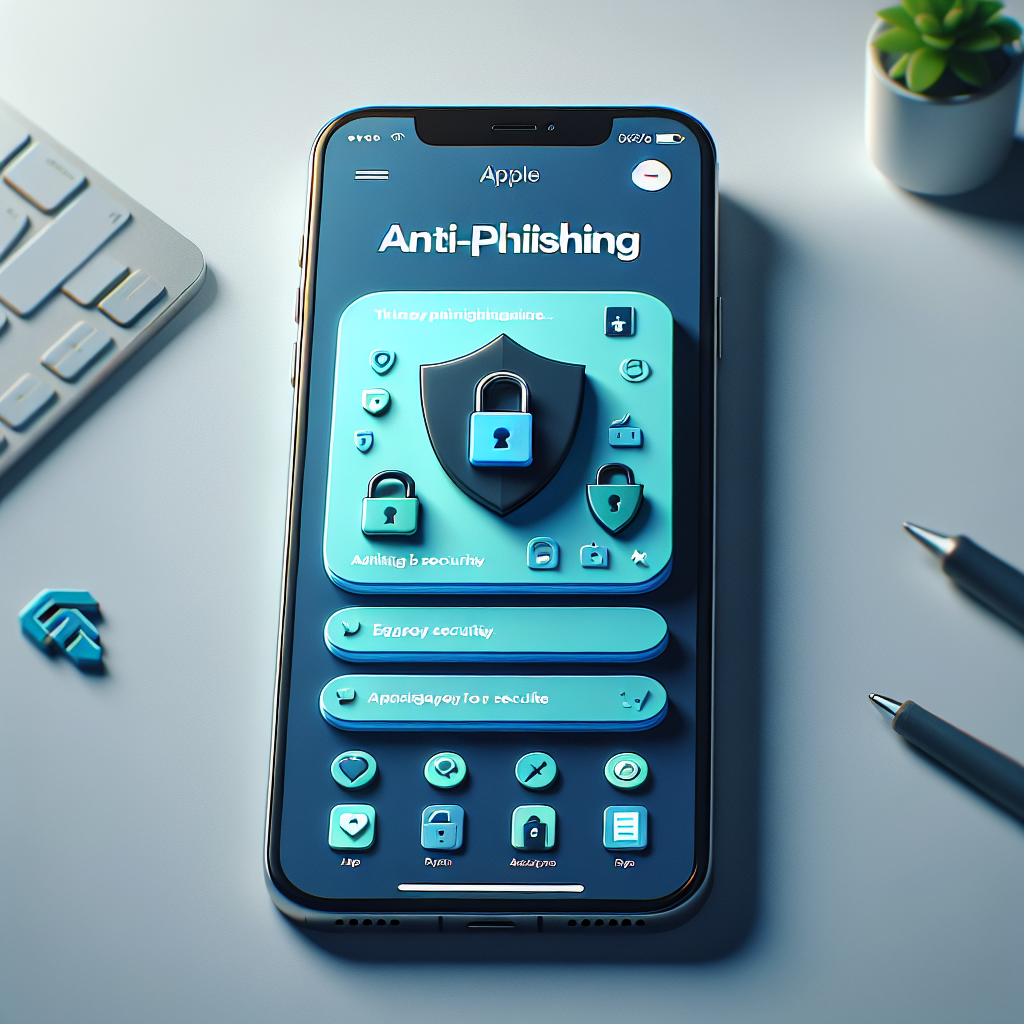In today’s cyber world, the threat of falling victim to phishing attacks has become all too real. Protecting your personal information is more important than ever, and that’s where the Anti-Phishing App for iPhones comes in. This innovative app is your first line of defense against fraudulent schemes and malicious emails designed to steal your sensitive data. With cutting-edge technology and real-time updates, this app provides a secure browsing experience, warning you of potential threats before it’s too late. Safeguard your privacy and stay one step ahead of cybercriminals with the Anti-Phishing App for iPhones.
Understanding Phishing Attacks

Phishing is a fraudulent practice of sending emails or messages claiming to be from reputable companies in order to induce individuals to reveal personal information, such as passwords and credit card numbers. It is a common cybercrime tactic that preys on people’s trust and naivety.
Common Methods Used in Phishing Attacks
- Email Spoofing: Attackers send emails that appear to be from a legitimate source, such as a bank or a social media platform, but are actually designed to steal personal information.
- Link Manipulation: Phishing emails often contain links that direct users to fake websites that mimic real ones, tricking them into entering sensitive data.
- Social Engineering: Phishers use psychological manipulation to deceive individuals into divulging confidential information, such as pretending to be a trusted contact or authority figure.
Risks Associated with Falling Victim to Phishing Scams
- Identity Theft: Phishing attacks can lead to identity theft, where personal information is used to impersonate individuals for financial gain or other fraudulent activities.
- Financial Loss: By obtaining banking or credit card details, phishers can make unauthorized transactions, leading to financial losses for the victims.
- Data Breaches: Falling victim to a phishing scam can also result in data breaches, compromising sensitive information that can be used for further cybercrimes.

Importance of Cybersecurity on iPhones
Cybersecurity on iPhones is becoming increasingly crucial in today’s digital landscape. With the rising prevalence of cyber threats targeting iOS devices, users must be aware of the risks and take proactive measures to protect their data.
- Overview of cybersecurity threats on iPhones
- iPhones are not immune to phishing attacks, malware, and other cyber threats that can compromise sensitive information.
-
Phishing attacks, in particular, have become more sophisticated and difficult to detect, making it essential for users to have robust security measures in place.
-
Risks of data breaches on iPhones
- Data breaches on iPhones can lead to identity theft, financial loss, and reputation damage.
-
Personal and financial information stored on iPhones, such as login credentials and payment details, are prime targets for cybercriminals.
-
Need for proactive security measures on iOS devices
- Implementing an anti-phishing app can help users identify and avoid malicious websites and emails.
- Regularly updating iOS software and using strong, unique passwords can also enhance the security of iPhones against cyber threats.
Introducing Anti-Phishing Apps
for iPhones
In the digital age, ensuring the security of personal information is paramount. With the rise of cyber threats, such as phishing scams, individuals must take proactive measures to safeguard their data. One effective tool in this battle against online fraud is the anti-phishing app, specifically designed for iPhones.
What are anti-phishing apps?
Anti-phishing apps are specialized software applications designed to detect and prevent phishing attacks on mobile devices. These apps utilize sophisticated algorithms and databases to identify fraudulent websites, emails, or messages that attempt to deceive users into divulging sensitive information, such as passwords, credit card details, or personal identification numbers.
How do anti-phishing apps work?
Anti-phishing apps work by analyzing the content and context of incoming data to determine its legitimacy. When a user interacts with a suspicious link or message, the app scans the information for known phishing indicators, such as mismatched URLs, spelling errors, or requests for confidential data. If a potential threat is detected, the app alerts the user and provides guidance on how to proceed safely.
Benefits of using anti-phishing apps on iPhones
-
Enhanced Security: By installing an anti-phishing app on their iPhones, users can significantly reduce the risk of falling victim to phishing scams, thereby protecting their sensitive information from unauthorized access.
-
Real-Time Protection: Anti-phishing apps offer real-time monitoring and detection capabilities, allowing users to stay informed about potential threats and take immediate action to mitigate risks.
-
User-Friendly Interface: Most anti-phishing apps are designed with an intuitive interface that makes it easy for users to navigate and understand the security alerts and recommendations provided by the app.

In conclusion, anti-phishing apps play a crucial role in safeguarding iPhone users against online fraud and identity theft. By leveraging the advanced technology and features of these apps, individuals can browse the internet with greater peace of mind and confidence in their digital security.
Features to Look for in an Anti-Phishing App
When considering an anti-phishing app for iPhones, there are several key features that users should prioritize to ensure comprehensive protection against malicious online attacks.
Real-time phishing protection
- Real-time monitoring: The app should constantly scan websites and online communications in real-time to detect and block any phishing attempts promptly.
- Immediate alerts: Users should receive instant notifications when they encounter a potentially harmful website or message, allowing them to take necessary precautions immediately.
URL scanning and verification
- Automated checks: The anti-phishing app should automatically scan URLs embedded in emails, messages, or web browsers to verify their legitimacy.
- Database integration: Integration with databases of known phishing sites can enhance the app’s ability to recognize and block suspicious links effectively.
Email and messaging protection
- Content analysis: The app should analyze the content of incoming emails and messages for signs of phishing tactics, such as spoofed sender addresses or suspicious attachments.
- Attachment scanning: Advanced features may include scanning email attachments for malware or phishing links to prevent users from inadvertently downloading harmful content.
User-friendly interface
- Intuitive design: A user-friendly interface is essential for ensuring that individuals can easily navigate the app’s features and settings.
- Clear alerts: The app should provide clear and actionable alerts to guide users on how to respond to potential phishing threats effectively.
Compatibility with iOS devices
- Seamless integration: The anti-phishing app should be optimized for iOS devices, ensuring smooth performance and compatibility with the iPhone operating system.
- Regular updates: Developers should provide frequent updates to the app to address new phishing techniques and vulnerabilities in iOS platforms, ensuring ongoing protection for users.
Top Anti-Phishing Apps for iPhones
App 1: SecureGuard
- Features:
- Utilizes advanced AI technology to detect phishing attempts in real-time.
- Offers a secure browsing feature that warns users of potentially harmful websites.
-
Provides regular updates to ensure protection against the latest phishing techniques.
-
Pros:
- User-friendly interface that is easy to navigate.
- Customizable settings to tailor protection levels based on user preferences.
-
Offers in-app support for any queries or issues encountered by users.
-
Cons:
- Some users may experience occasional delays in updating the app’s phishing database.
- The free version has limited features compared to the premium version.
App 2: PhishBlocker
- Employs a database of known phishing websites to block suspicious links.
- Allows users to report potential phishing emails or websites for community protection.
-
Integrates with email clients to provide real-time scanning of incoming messages.
-
Offers seamless integration with popular email services like Gmail and Outlook.
- Provides detailed reports on blocked phishing attempts for user awareness.
-
Regularly updates its database to stay ahead of emerging phishing threats.
-
May consume additional device resources while running in the background.
- Some users report occasional false positives, flagging legitimate websites as phishing threats.
App 3: SafeBrowse
- Utilizes machine learning algorithms to analyze website credibility and potential phishing indicators.
- Offers a secure VPN feature for encrypted browsing on public Wi-Fi networks.
-
Includes a password manager for secure storage of sensitive login information.
-
Multi-layered protection with phishing detection, VPN, and password management in a single app.
- Customizable security settings to adjust protection levels based on user preferences.
-
Regular security audits to maintain high standards of data protection.
-
The VPN feature may require a subscription for full access to all servers.
- Some users may find the initial setup process slightly complex due to the app’s comprehensive security features.
Best Practices for Enhancing iPhone Security
When it comes to protecting your iPhone from phishing attacks, there are several best practices you can implement to enhance your device’s security. Here are some key strategies to consider:
-
Keep software up to date: Regularly updating your iPhone’s operating system and apps is crucial in preventing potential vulnerabilities that phishers may exploit. Software updates often include security patches that address known threats, so staying current is essential in safeguarding your device.
-
Enable two-factor authentication: Adding an extra layer of security with two-factor authentication can significantly reduce the risk of unauthorized access to your accounts. By requiring a second form of verification, such as a code sent to your phone or email, you can thwart phishing attempts even if a scammer manages to obtain your login credentials.
-
Educate yourself on phishing awareness: Being able to recognize common phishing tactics and red flags can help you avoid falling victim to fraudulent schemes. Stay informed about the latest phishing trends, such as fake emails, texts, or websites designed to trick you into revealing sensitive information.
-
Regularly review app permissions: Check the permissions granted to your apps to ensure they are not overreaching or accessing more data than necessary. Restricting app permissions can limit the amount of personal information exposed in the event of a phishing attack or data breach.
-
Backup data regularly for added security: In case of a successful phishing attack or data loss, having regular backups of your iPhone’s data can help you restore your information and minimize the impact of a security incident. Utilize iCloud or other backup solutions to keep your data safe and easily recoverable.
FAQs: Anti-Phishing App for iPhones
What is an anti-phishing app for iPhones?
An anti-phishing app for iPhones is a mobile application designed to protect users from phishing attacks. Phishing is a form of online scam where hackers try to trick individuals into giving out sensitive information such as passwords, credit card numbers, and personal details. The app helps to detect and prevent phishing attempts by identifying fraudulent websites and warning users before they disclose any information.
How does an anti-phishing app for iPhones work?
Anti-phishing apps for iPhones work in the background to monitor the websites that users visit and alert them if they come across a potentially harmful website. These apps use various methods like real-time website analysis, URL scanning, and blacklisting known phishing websites to identify and block suspicious links. Some apps also offer additional features like secure browsing, anti-tracking, and identity theft protection.
Can an anti-phishing app protect me from all types of phishing attacks?
While an anti-phishing app for iPhones can significantly reduce the risk of falling victim to phishing attacks, it is not foolproof. Hackers are constantly developing new tactics to trick users, so it is essential to stay vigilant and practice safe browsing habits. Using an anti-phishing app in conjunction with other security measures like strong passwords, two-factor authentication, and regular software updates can help enhance your overall protection against phishing scams.
Are there any free anti-phishing apps available for iPhones?
Yes, there are free anti-phishing apps available for iPhones that offer basic protection against phishing attacks. These apps typically provide essential features like URL scanning and website blacklisting. However, for more advanced protection and additional security features, you may need to invest in a premium anti-phishing app.
How can I choose the best anti-phishing app for my iPhone?
When selecting an anti-phishing app for your iPhone, consider factors such as the app’s reputation, user reviews, features offered, and compatibility with your device. Look for apps that are regularly updated to stay ahead of new phishing threats and offer comprehensive protection against various types of scams. Additionally, check if the app offers additional security features like password managers, VPN services, and data encryption to further safeguard your online activities.